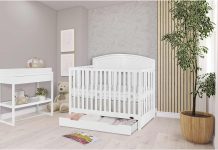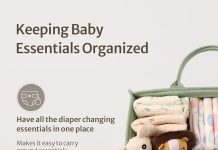The first few months of parenthood can be both thrilling and overwhelming. As new parents, we often find ourselves constantly second-guessing our every move, especially regarding the safety and well-being of our precious newborn.
One common question that many parents wonder about is whether it’s okay to leave their newborn alone for just five minutes. In this article, we’ll explore this topic in-depth and provide valuable insights and tips to help you navigate this exciting yet nerve-wracking stage of parenthood.
Review contents
The Importance of Constant Supervision
Newborn safety should be a top priority for every parent. As attentive caregivers, we must always prioritize the well-being of our little ones, especially during their first few months of life. Newborns are incredibly vulnerable, and as such, they require constant supervision to ensure their safety and protection. While it may be tempting to leave a newborn alone for a few minutes, it is crucial to understand the potential dangers and risks associated with this decision.
Potential dangers in leaving a newborn alone
Leaving a newborn alone, even for just a few minutes, can expose them to various risks. Newborns have limited mobility and cannot protect themselves or seek help when needed. For instance, they may become entangled in blankets or cords, leading to strangulation. Leaving them unattended also increases the risk of falls from elevated surfaces or objects near them toppling over onto them. Additionally, newborns may accidentally suffocate if they cannot clear their airways when positioned incorrectly. It is important to remember that even brief moments of unsupervised time can severely affect their safety.
Understanding the vulnerability of newborns
To truly appreciate the significance of constant supervision, it is essential to understand the vulnerability of newborns. Physically, their bodies are incredibly delicate, and lack the strength and motor skills to protect themselves from harm. Their immune systems are also undeveloped, making them susceptible to illnesses and infections. Moreover, newborns rely on others for their survival. They depend on caregivers to nourish them, maintain their hygiene, and ensure their general well-being. Recognizing their fragility can be a powerful motivator to prioritize their constant supervision.
Maternal Instincts and Intuition
As new parents, we may be bombarded with conflicting advice and opinions on caring for our newborn. While it is important to consider external information, it is equally crucial to trust our instincts and develop a strong bond with our baby. Maternal instincts are a natural part of being a mother, and they are invaluable when understanding and responding to our baby’s needs.
Trusting your instincts as a new parent
No one knows your baby better than you do. Trusting your instincts can offer you a sense of confidence and reassurance. Remember that you are your baby’s primary caregiver, and no one else possesses the same level of connection and understanding that you do. Your instincts are a powerful tool to help guide you in making decisions for your newborn’s well-being. By listening to that inner voice, you can respond to your baby’s needs with love, care, and expertise.
Developing a strong bond with your newborn
Building a strong bond with your newborn is emotionally fulfilling and crucial for their overall development. Spending attentive, quality time with your baby creates a solid foundation of trust and emotional security. This bond forms the basis for your baby’s future relationships and interactions with others. You can establish a secure attachment that enhances their emotional, cognitive, and social development through nurturing touch, gentle words, and consistent care.
Recognizing and responding to your baby’s needs
Babies communicate primarily through cues and signals, often in the form of crying. By paying close attention to your baby’s cues, you can begin to understand their needs and respond accordingly. Whether it is a diaper change, hunger, discomfort, or the need for sleep, recognizing and addressing these needs promptly can foster a sense of security and well-being in your newborn. As you spend more time with your baby, you will become attuned to their unique signals, allowing you to provide the care they require more efficiently.
The Benefits of Responsive Parenting
Responsive parenting, also known as sensitive parenting, is an approach that emphasizes the importance of attentively and promptly responding to a baby’s cues and needs. This parenting style has numerous benefits for both the child and the parent, including promoting healthy brain development, establishing trust and emotional security, and enhancing the parent-child relationship.
Promoting healthy brain development through interaction
Research has shown that responsive parenting is crucial in facilitating healthy brain development in infants. When parents consistently respond to their baby’s needs, they create an environment rich in positive interactions and experiences. This responsive interaction helps to develop neural connections, strengthen cognitive abilities, and enhance overall brain development. By engaging with our newborns sensitively and responsively, we are laying the foundation for their future learning and social development.
Establishing trust and emotional security
Responsive parenting is essential for building a strong sense of trust and emotional security in babies. When caregivers promptly and sensitively meet their baby’s needs, they send a message that their baby is valued, loved, and safe. This consistent response to cues and feelings fosters a secure attachment, allowing the baby to feel confident in exploring their environment and seeking comfort when needed. The emotional security provided by responsive parenting promotes healthy emotional regulation, resilience, and a positive sense of self.
Enhancing the parent-child relationship
A nurturing and responsive parenting approach strengthens the bond between parents and their newborns. By consistently meeting their baby’s needs and engaging in positive interactions, parents create a deep connection built on love, trust, and understanding. This bond forms the basis for a healthy and loving relationship as the child grows older. Through responsive parenting, parents can establish a secure attachment that paves the way for open communication, respect, and lifelong emotional connection.
Creating a Safe Environment
Ensuring a safe environment is crucial for a newborn’s well-being. By taking proactive measures, such as childproofing our homes, following safe sleep practices, and recognizing the importance of immediate response to our baby’s needs, we can significantly reduce the risk of accidents and create a secure space for our little ones to thrive.
Childproofing your home
Before bringing your newborn home, it is vital to childproof your living space. This involves identifying and eliminating potential hazards that could threaten your baby’s safety. Secure heavy furniture to prevent tip-overs, cover electrical outlets, install safety gates at stairways, and keep small objects out of reach. Creating a child-friendly environment can minimize the risk of accidents and provide a secure space for your baby to explore without worry.
Safe sleep practices
Safe sleep practices are essential to protect against Sudden Infant Death Syndrome (SIDS) incidents and other sleep-related dangers. It is recommended to place your baby on their back to sleep on a firm and flat surface. Avoid using pillows, blankets, or stuffed toys in the crib, as these pose suffocation risks. Ensure your baby’s sleep area is free from hazards, such as cords or excessive bedding. Adhering to these safe sleep guidelines can promote a safe and restful sleep environment for your newborn.
Knowing the importance of immediate response
Newborns rely on caregivers to promptly respond to their needs. Understanding the importance of immediate response is crucial for their safety and emotional well-being. Whether your baby is hungry, needs a diaper change, or seeks comfort, being responsive promptly reinforces their trust. This responsiveness ensures their immediate needs are met and communicates that they are valued and loved. Responding promptly to your baby’s cues creates a secure environment where they feel heard, seen, and understood.
Alternatives to Leaving Your Newborn Alone
While constant supervision is necessary, strategies and alternatives exist to leave your newborn alone. By seeking assistance from a trusted caregiver, implementing a baby monitor system, and planning activities to keep your newborn engaged, you can balance the need for supervision with the demands of everyday life.
Seeking assistance from a trusted caregiver
It is perfectly acceptable to ask for help when caring for your newborn. Reach out to trusted family members, friends, or even professional caregivers who can step in and provide temporary supervision. This allows you to tend to other responsibilities or take much-needed breaks while ensuring your baby remains safe and well-cared for. By building a support network, you can lean on others when you need to step away briefly.
Implementing a baby monitor system
A baby monitor system is a valuable tool that can provide extra peace of mind and ensure your newborn’s safety when you need to be in a different part of the house. With audio and video capabilities, baby monitors allow you to monitor your baby closely while attending to other tasks. By placing the monitor within your line of sight, you can promptly observe and respond to your baby’s needs, even when you are not physically in the same room.
Planning activities to keep your newborn engaged
Engaging your newborn in age-appropriate activities can provide valuable stimulation while allowing you to tend to other obligations within sight and reach. Consider using a baby sling or carrier when necessary, so your baby can be close to you while you do your daily tasks. Singing, reading, and talking to your baby are simple yet effective strategies to keep them engaged and entertained. By planning activities that involve your baby, you can balance supervision with productivity, ensuring their safety while fostering their development.
The Potential Risks of Leaving Your Newborn Alone
Leaving your newborn alone, even briefly, carries inherent risks that can impact their physical safety and emotional well-being. Understanding these potential risks is crucial in making informed decisions about their care and ensuring their health and happiness.
Increased risk of accidents or injuries
When a newborn is left unattended, the risk of accidents or injuries increases significantly. They may roll over, fall from elevated surfaces, or become entangled in cords or blankets. Household objects that may seem harmless can pose dangers when left within reach of a curious baby. Maintaining constant supervision can prevent these accidents and provide immediate assistance when necessary.
Negative impact on emotional well-being
Newborns thrive on love, attention, and human interaction. They may experience loneliness, anxiety, or distress when left alone for extended periods. Lack of emotional support can hurt their emotional and psychological well-being, potentially leading to long-term repercussions. By prioritizing our presence and responsiveness, we provide a secure, nurturing environment that fosters emotional growth and well-being.
Potential development of separation anxiety
Leaving a newborn alone too early or too frequently can contribute to the development of separation anxiety. Separation anxiety is a normal part of childhood development, typically around 6-8 months. However, prolonged periods of isolation during the early stages can intensify these feelings of fear and distress for a child. By staying present and attuned to our baby’s needs, we can help alleviate anxiety and build trust and security.
Support and Resources for New Parents
As new parents, we must recognize that we are not alone. Numerous support systems and resources are available to provide guidance, reassurance, and valuable information. By joining parenting support groups, consulting healthcare professionals, and accessing online resources, we can gain the support we need to navigate the joys and challenges of parenthood.
Joining parenting support groups
Parenting support groups offer an invaluable network of understanding individuals who are going through similar experiences. These groups provide a safe space to share concerns, seek advice, and form lasting friendships. Whether in-person or virtual, joining a parenting support group can offer emotional support, practical tips, and a sense of community that can be incredibly reassuring during this transformative phase of life.
Consulting healthcare professionals for guidance
Healthcare professionals, such as pediatricians and lactation consultants, play a vital role in supporting new parents. These experts can provide valuable guidance, discuss any concerns you may have, and offer evidence-based advice tailored to your baby’s specific needs. Whether attending well-baby check-ups or seeking advice on feeding techniques, consulting healthcare professionals can ensure you have the knowledge and resources to make informed decisions about your baby’s care.
Accessing online resources for valuable information
The digital age has opened up a wealth of knowledge and information. Utilize reputable online resources to access articles, blogs, and forums dedicated to newborn care. Websites of trusted organizations, such as the American Academy of Pediatrics, can provide evidence-based information on topics ranging from feeding and sleep to safety and development. Online resources offer a convenient and accessible platform for learning and sharing experiences, enabling us to stay informed and connected as new parents.
Finding a Balance: Self-Care and Parenting
While the care and well-being of our newborns are paramount, it is equally crucial to prioritize our physical and emotional well-being. Recognizing the importance of self-care, identifying when it’s safe to step away, and creating a support system for parental breaks are essential elements in balancing our baby’s needs and tending to our own.
Recognizing the importance of self-care
Self-care is not selfish; it is essential to maintaining our overall well-being. As parents, it is crucial to recognize our needs and the importance of caring for ourselves. Prioritizing activities that promote physical, mental, and emotional well-being, such as exercise, healthy nutrition, and adequate rest, allows us to recharge and be the best version of ourselves for our newborns.
Identifying when it’s safe to step away
Constant supervision does not mean we cannot step away momentarily when it is safe. Identifying opportune moments, such as when our baby is safely asleep or content, allows us to take short breaks for self-care or attend to other responsibilities. However, exercising caution and ensuring our baby is in a secure and monitored environment before stepping away is essential.
Creating a support system for parental breaks
Building a support system of family, friends, or trusted caregivers can provide the necessary support for well-deserved parental breaks. By enlisting the help of loved ones or exploring childcare options, we can have peace of mind knowing that our baby is in capable hands while we take time for ourselves. Establishing a support system benefits us as individuals and strengthens our bond with our baby through shared experiences and relationships.
Encouraging Independent Play
As our baby grows and develops, encouraging independent play becomes integral to their cognitive and social development. Gradually introducing solo playtime, choosing age-appropriate toys and activities, and ensuring a safe and stimulating environment are critical elements in fostering independent play skills.
We are gradually introducing solo playtime.
Solo playtime allows babies to explore their surroundings, develop their imagination, and foster independence. Gradually introducing solo playtime by starting with short periods and gradually increasing the duration can help your baby become comfortable with independent play. It is essential to ensure that the environment is safe and free from hazards and that you remain within sight and reach to provide reassurance and support.
Choosing age-appropriate toys and activities
Age-appropriate toys and activities are essential in promoting independent play skills. Select toys matching their developmental stage and abilities as your baby grows. Toys that stimulate their senses encourage exploration, and promote problem-solving skills can provide valuable engagement during independent playtime. Simple activities, such as stacking blocks, playing with soft toys, or exploring safe household objects, can foster curiosity and stimulate their cognitive and motor skills.
Ensuring a safe and stimulating environment
Creating a safe and stimulating environment is crucial for independent play. Remove any potential hazards, lock away substances that could be harmful, and ensure that the play area is free from sharp edges or small parts that could pose a choking hazard. Provide a variety of safe and age-appropriate toys that spark your baby’s interest and encourage exploration. By creating a secure and stimulating environment, you can nurture independent play skills while ensuring your baby remains safe.
Building a Network of Support
Navigating the journey of parenthood can be challenging, but building a support network can provide the necessary assistance and resources. Enlisting the help of family and friends, exploring childcare options, and considering in-home nanny services are effective ways to build a robust support system.
Enlisting the help of family and friends
Family and friends can play a significant role in providing support during the early stages of parenthood. Whether helping with household chores, running errands, or spending time with your newborn, their assistance can provide much-needed relief and create space for self-care. Be open and communicate your needs and preferences, allowing your loved ones to contribute meaningfully.
Exploring childcare options
Exploring childcare options can offer flexibility and freedom for parents. Depending on your circumstances, you may consider enrolling your newborn in a reputable childcare center or hiring a professional caregiver who can provide personalized care within the comforts of your home. Understanding the available options and doing thorough research can help you make an informed decision that aligns with your family’s needs and values.
Considering in-home nanny services
In-home nanny services can provide personalized care for your newborn while allowing you to maintain a sense of control and involvement. A professional nanny can offer dedicated attention and support to your baby’s unique needs while ensuring their safety and well-being. Hiring a reputable and experienced nanny can establish a trusted relationship built on mutual understanding and open communication.
In conclusion, constant supervision is vital for the safety and well-being of newborns. The vulnerability of newborns highlights the need for diligent caregiving and responsiveness. By implementing strategies to create a safe environment, seeking support from trusted individuals, and prioritizing self-care, we can strike a balance between meeting our baby’s needs and ensuring our own physical and emotional well-being.
Building a support network, encouraging independent play, and utilizing available resources can equip us with the necessary tools to navigate parenthood’s joys and challenges. Remember, prioritizing constant supervision and responsive parenting can lay the foundation for our newborn’s healthy development and thriving future.






























